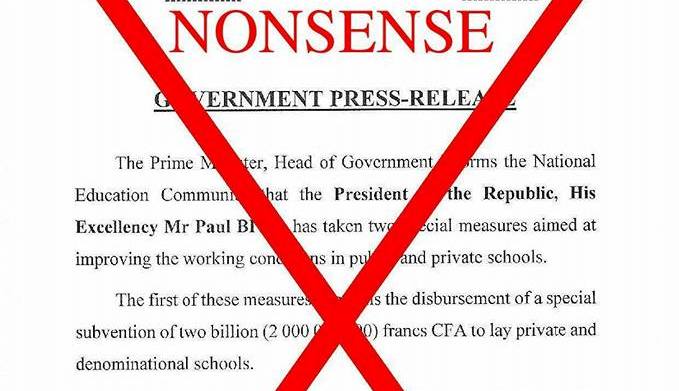Time to get the Federal Government of Nigeria to respect its own High Court Ruling of 2002: The Federal High Court of Abuja, Nigeria
SCAPO took the Federal Government to the Federal High Court in Abuja to demand that the Federal Government honors its obligations under the African Charter of Human and Peoples Rights by taking up the case of the self-determination of the people of the former the British Southern Cameroons to the International Court of Justice and to the United Nations General Assembly. After a very passionate debate on the admissibility of such a case brought by a foreign group, Justice Rosaline Ukeje finally ruled the case admissible and went on to hear the substance. Justice Rosaline Ukeje finally issued a landmark ruling on March 5, 2002 demanding that:
The Federal Republic of Nigeria shall institute a case before the International Court of Justice concerning the following:
1) Whether the Union envisaged under the British Southern Cameroons Plebiscite 1961 between LRC and the British Southern Cameroons took effect as contemplated by the relevant United Nations Resolutions particularly United Nations General Assembly Resolution 1352 (XIV) of October 16, 1959 and United Nations Trusteeship Council Resolution 2013 (XXIV) of May 31, 1960.
2) Whether the termination by the government of the United Kingdom of its trusteeship over the British Southern Cameroons on September 30, 1961 without ensuring prior implementation of the Constitutional arrangements under which the British Southern Cameroons and LRC were to unite as one Federal State was not in breach of Articles 3 and 6 of the Trusteeship Agreement for the Territory of the Cameroons Under British Administration approved by the General Assembly of the United Nations on December 13, 1946, the United Nations General Assembly Resolutions 1352 of October 16, 1959; 1608 of April 21, 1961, and United Nations Trusteeship Council Resolution 2013 (XXIV) of May 31 1960 and Article 76 (b) of the Charter of the United Nations;
3) Was the assumption of the Sovereign Powers on October 1, 1961 and the continued exercise of same by the government of LRC over the British Southern Cameroons (after termination by the government of the United Kingdom of its Trusteeship over the territory) legal and valid when the Union between the British Southern Cameroons and LRC contemplated by the British Southern Cameroons Plebiscite 1961 had not legally taken effect?
4) Whether the peoples of the British Southern Cameroons are not entitled to self-determination within their clearly defined territory separate from LRC;
5) Whether it is the British Southern Cameroons and not LRC that shares a maritime boundary with the Federal Republic of Nigeria.
In March 2002, the Hon Mrs Justice Rosaline Ukeje in March 2002 was delivered The Tomlin Order on the SCAPO Case. The ruling ordered the Federal Republic of Nigeria to take any other measures as may be necessary to place the case of the peoples of the geographical territory known as at October 1, 1960 as the British Southern Cameroons for self-determination before the United Nations General Assembly and any other relevant international organizations. The Ruling also banned past, present and future governments of the Federal Republic of Nigeria from considering the British Southern Cameroons as part of LRC. The Obasanjo regime ignored the above ruling as well as the Buhari regime
The Nigerian volte face seems to have developed because of Nigerian occupation of the former UN Trust Territory of the British Northern Cameroons. As Mola Njoh Litumbe points out, the fact of the matter is that both Nigeria and LRC seem to be in the same “cassalla soup” for, as members of the UN since 1960, they took over portions of the UN trust territory of British Southern Cameroons without complying with Article 102 of the UN Charter. If the argument is that Nigeria was right in acquiring British Northern Cameroons, does it not follow that the British Southern Cameroons too would have no case for a separate existence!
As far as I can see therefore, says Mola Njoh Litumbe, the Northern Cameroons equation has to be painfully brought in, so that the fate of a territory known and fully demarcated by the UN in Article 1 of the Trust Agreement of 13 Dec 1946 with Britain, can be introduced at the ICJ which is an organ of the UN. The division of the territory into a Northern and Southern portion by Britain was a domestic affair for administrative convenience, and does not affect the corporate identity of the UN territory of British Cameroons, of which the Southern Cameroons, like Victoria Division or Kumba division, is but a part
SCAPO and the African Human Rights Court in Banjul:
In 2003, SCAPO also filed a case in the African Commission on Human Rights of behalf of the British Southern Cameroons. DR. GUMNE & MEMBERS OF THE SCNC AND SCAPO (for themselves and on behalf of the People of the British Southern Cameroons) Versus LRC took the case from a Human Rights angle. The substance of the complaint (Per COMMUNICATION NO 266/2003 is that the rights recognized to peoples under the African Charter on Human and Peoples’ Rights have, for the people of the British Southern Cameroons, been suppressed by LRC (the Respondent State) through domination and colonization in violation of the Charter; and that LRC is guilty of a series of gross, massive, continuing and reliably attested human rights violations in respect of named citizens and groups of citizens of the British Southern Cameroons. and the SCNC 37th Session of the African Commission on Human & Peoples Rights.
Consequently, the Commission is requested to find LRC (the Respondent State) guilty of these violations; to reaffirm the inherent, unquestionable and inalienable right of the people of the British Southern Cameroons to self-determination, and thus to the enjoyment of all the rights recognized to peoples under the Charter; to reaffirm the right of the people of the British Southern Cameroons to live in peace and security as a free people; to call on States parties to the Charter to assist the people of the British Southern Cameroons in their liberation struggle against the foreign domination of LRC; to call on LRC (Respondent State) to end its continuing violation of the human rights of individual the British Southern Cameroons citizens; and to find that victims of human rights violations by LRC are entitled to adequate compensation.
The complainants were:
1) Dr. Kevin Ngwang Gumne (Deceased)
2) Augustine Feh Ndangam
3) Dr. Martin Ngeka Luma (Deceased)
4) Chief Ayamba Ette Otun (Deceased)
5) Mr. Nfor Ngala Nfor
6) Humphrey Mbinglo (Deceased)
7) Mr. Albert Womah Mukong (Deceased)
8) Isaac M. Sona
9) Dr. Emil Mondoa
10) Dr. Tayoba Ngenge
11) Dr. Stephen Shemlon
12) Dr. Martin Ayim
13) Dr. J Asongu
14) Mrs. Regina Mankefor (Deceased)
15) Ms Melissa Nambangi
16) Mr. Andrew Edimo
17) Tum Tafon(Deceased)
18) Dennis Atemkeng
The complainants were represented by Prof. Carlson Anyangwe, as lead Counsel and the law firm of Akinlawon & Ajomo of Lagos, Nigeria. The complaint recites that La République du Cameroun is guilty of violating the rights of hundreds of citizens of the British Southern Cameroons and the collective rights of the People of the British Southern Cameroons. Prof Carlson is currently the Secretary of State for Foreign Affairs in the present Interim Government.
By Ntemfag Ofege






2 comments
This arrest is one of the biggest failure of LRC, what we call fundamental error. Nigeria is very smart and I think they knew exactly what they were doing.
LRC thinks it will archive something, but they will finally realize they failed big time. As always I can count on LRC when it comes to nonsense reasoning.
The shame of the century is about to fall on LA RC sooner intelligence is more than power,Nigeria will a learn that the court ruling of the Nigerian high court was not a joke